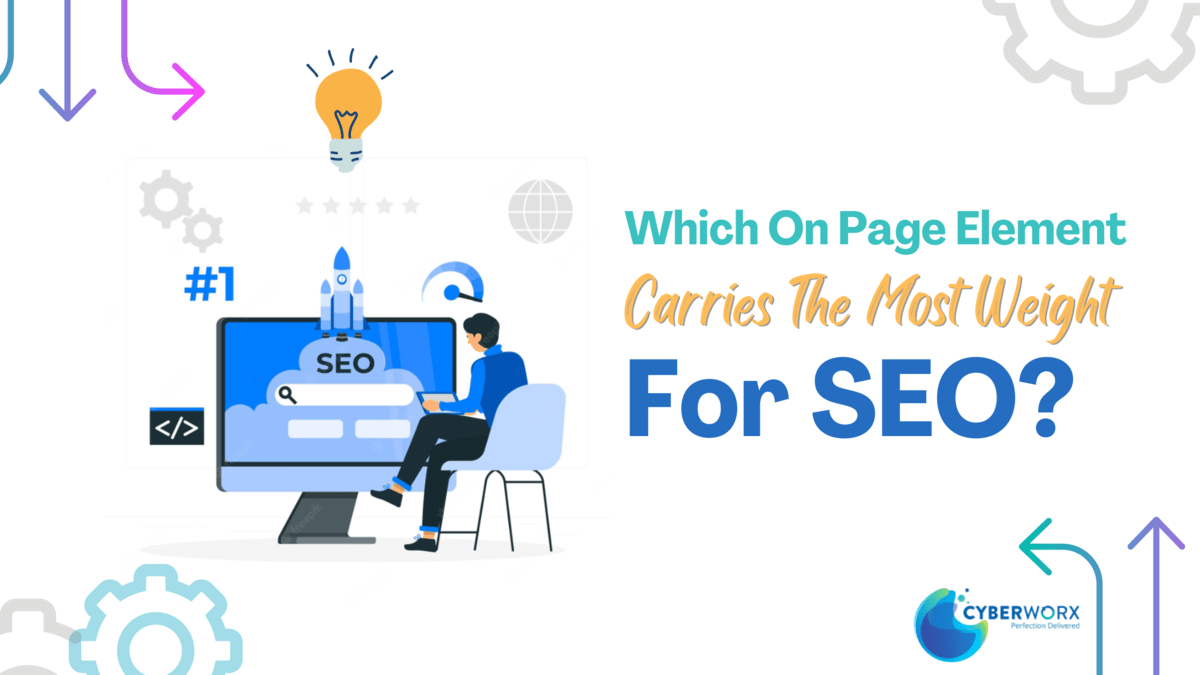Cyberworx Technologies Pvt Ltd
C-9/15, Sector-7, Rohini, New Delhi
Delhi110085, INDIA
IN:+91-8377009038


On-Page SEO is a daunting task, says many SEO experts. With numerous moving parts involved, it could be tricky to understand which on-page element carries the most weight for SEO.
The reality is that for the best results, you should aim to optimize each and every element that makes up on-page SEO. In case you find it challenging to meet all the optimization markers, it's useful to understand which on-page element has the most significant impact on SEO. This knowledge can assist you in determining what to focus on first.
If you are wondering what to focus on the most when it comes to on-page SEO, this article below is an attempt to cover the most important aspect of your question right from the start.
SEO tasks are majorly divided into three categories:
On-page SEO, also referred to as On-site SEO, is the process of optimizing a web-page’s content, title, internal links, etc. with the aim of improving its search page visibility.
For search engines to better understand your content and readers find your content at the right time for the right experience, it’s vital that your On-Page SEO game is on point.
Before we get into the main question, let’s have a look at other important elements of on-page SEO.
Here are some of the important elements of on-page SEO that might not carry the same weight as meta titles, but a combination of all can give the best results. Therefore along with understanding which On Page element carries the most weight for SEO, the information will help you go a long way.
Now coming back to the main question, which On-page SEO element carries the most weight for SEO? Title Tag of the on-page SEO carries the most weight.
A title tag, also known as a meta title, is an HTML element that specifies the title of a web page. It appears in the search engine results pages (SERPs) as the clickable link that users see when they perform a search. The title tag is also displayed at the top of the browser window when the page is open.
A title tag plays a major role in a website’s SEO. So, it should be accurate and must justify what content would be found inside the title.
Having an optimized title tag is crucial for a web page.
Title tags are very important because they improve your SEO. A title tag that’s not optimized means very low chances of people discovering your website when they put their search query on the SERP. Also, the tag’s length should be just how long it should be. A longer or shorter title can negatively affect your SEO.
SEO professionals aim to drive traffic to their site from multiple sources. Social media platforms are one of them. When you share your site links on these platforms, the title tag is the only thing that’s visible. So, if you want people to click on your link, ace your title tag game. Keep it short, attractive, somewhat secretive, and a little bit of sassy if needed.
Oftentimes, we have many tabs open in our web browsers, agree? How do you know which browser has what content? It’s the title tag that gets displayed at the top. So, always add the primary keyword in the title so your users or readers don’t lose track, even if multiple tabs are running simultaneously.
Learn how to write an attractive title tag that looks inviting to users for clicks:
Your title tag must be summed up in 60 characters. A short title tag is MORE!
Each web page should have a unique and attractive title.
A good title tag is one that’s easily understandable and also straightforward.
Avoid overloading your content with keywords; use them judiciously.
Including numbers or dates in the title tag not only makes the title tag interesting but also gives an indication of some specific information in the content.
Including phrases like "limited time offer" or "act now" can create a sense of urgency and encourage users to click through to your website.
In conclusion, there are several on-page elements that contribute to the overall SEO performance of a website. However, when it comes to which On-page SEO element carries the most weight for SEO, we would recommend to level up your title tag games for reasons mentioned above.
But ultimately, a well-optimized website will have all of its on-page elements working together to create a positive user experience and improve its chances of ranking higher in the search engine results pages.
To ensure success on the online platform with optimal ranking, a competent SEO Agency with proven experience and expertise is all you need to maintain your position at the peak despite constantly changing algorithms.
CyberWorx Technologies is a leading SEO Agency in Delhi that helps business brands drive better revenue and grow their business exponentially with expert SEO services. Team up with us to achieve the top ranking and greater online visibility.